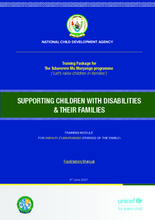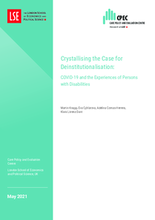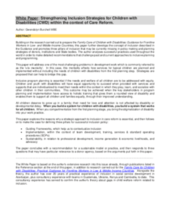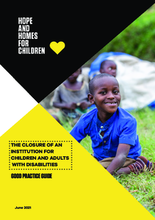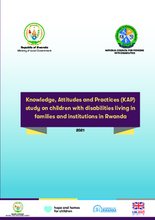Displaying 101 - 110 of 499
This is a Training Module for the Inshuti z’Umuryango volunteer community-based cadre to support the implementation of the Tubarerere Mu Muryango (TMM) Programme (‘Let’s raise children in families’) led by the National Child Development Agency (NCD).
Millions of persons with disabilities, children and older persons live in congregate settings. Whilst the motivation for providing such care may be well-intentioned, that is not always the case. Many of those settings are ‘institutional’, with residents denied autonomy and choice, provided with poor quality health and social care, and experiencing social isolation, neglect or abuse. This report summarises the evidence and experiences of persons living in congregate settings in general, and in terms of the impact of COVID-19, to understand the barriers to deinstitutionalisation, and to highlight the approaches that have sought to overcome those barriers.
This study addresses a gap in the literature regarding older youth with intellectual disabilities who are sexually victimized and pushed to engage in transactional sex while they are transitioning from child welfare systems involvement. It does so by examining risk and protective factors at the individual, micro, exo, and macro systems levels.
This study examines a promising new coping and parental competency (CPC) intervention for parents of children with special educational needs that targets parents' mental health outcomes.
This paper will address one of the most challenging problems in development work which is commonly referred to as the ‘silo mentality’. In this case, this mentality affects how services for typical children are planned and implemented without including the needs of children with disabilities from the first planning step. Strategies are proposed that can help to bridge this gap.
This report presents the findings from the National Survey of Residential Centres for Children with Disabilities in Rwanda. The survey aimed at gathering comprehensive and disaggregated data related to residents’ characteristics, staff profile, and the minimum standards for the centres.
Cambiando la Forma en que Cuidamos (o sus siglas en inglés, CTWWC) Guatemala realizó un estudio con el objetivo de identificar y documentar buenas prácticas en la prestación de servicios de cuidado residencial, con el objetivo de transformar los servicios de cuidado a la niñez en Guatemala.
This video tells the story of Georgi, a boy born with Down's Syndrome in Bulgaria whose parents were told they wouldn't be able to care for him and were encouraged to place him in an orphanage. They placed him in an orphanage and were later supported by Hope and Homes for Children to have him returned to their care.
This document outlines 5 key steps that serve as an effective blueprint for a successful reintegration process of children and disabilities. These include ‘engagement’, ‘Assessment’, ‘Design & Development’, ‘Transition’, and ‘Monitoring & Evaluation’.
This study is part of the response to the global call for the provision of quality alternative family-based care and prevention of family separation for children with disabilities. The study is premised on the view that the knowledge, attitudes, and practices regarding the attributes assigned to, and the conceptualization of, children with disabilities in their families and communities, vis-à-vis institutional care for children with disabilities, are also crucial determinants of barriers/ enablers of full and meaningful integration of children with disabilities into community life in Rwanda.

